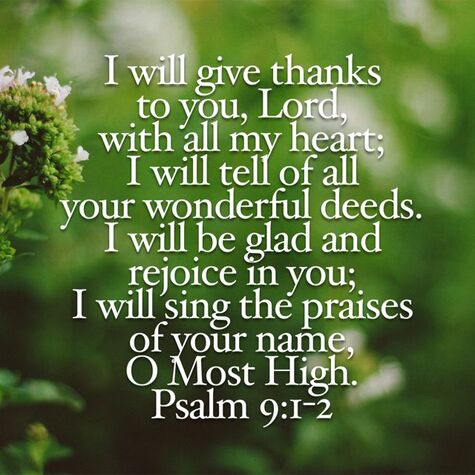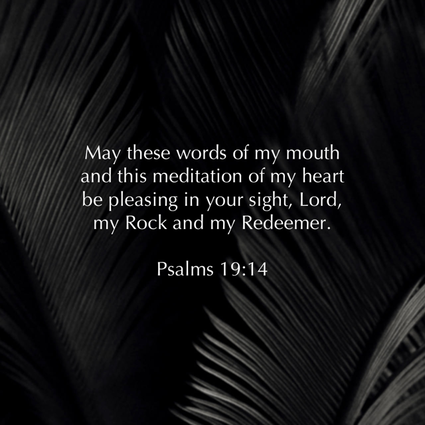|
Good morning! We're so glad you are joining us today! When we meet in person, we share our joys and concerns together. Take some time to consider your past week, and any prayer requests you might have. If you have anything you would like us to pray for, you can add it as a comment to this post. When you are ready, get started with a word of prayer (source): Heavenly Father, we believe and trust your Word, we want to grow in you more each day and to understand your promises for us. We commit our time together to you and ask that you heal and restore us as we dive into your Word. We want a deeper faith. We want to meet with you and know you better. So today, we say "yes" to what you want to show us as we read Scripture. Amen. This week's lesson is on Psalm 9:1-12. Poems can be hard to interpret but the Academy of American Poets has some tips that can help you delve into poetry with more confidence. First, they say to read it out loud. This can slow you down so you can hear the inflections of your own voice. Second, pay attention to where the lines or phrases break. Third, be curious and ask questions of the poem: who wrote it? When? Why? And finally be okay with the fact that you won’t always understand a particular poem. Sometimes it will dance outside of your grasp. These tips can help us not only understand but also enjoy the psalms. Give thanks with all your heart. Ancient Hebrews associated the heart with one’s intellect, the center of oral decision making. David is the author of this psalm. He is emphasizing the deliberate choice to praise God with the totality of his being. When he says ,”I will tell of all your wonderful deeds”. We take so many things that God does for us for granted. In last week’s sermon we were told to find something everyday that we see God He gave us all of creation to be thankful for. I thank God when I see the beautiful colors that the leaves change to in Fall. We know that God’s responsible for the complexity of our world. Verse 3 says, “My enemies turn back: they stumble and perish before you “. God directed mighty waters, toppled walls, hurled hailstones and extended daylight. In verse 9 the Lord is a refuse for the oppressed, a stronghold in times of trouble. The powerful persons are oppressing weak. But the refuse available in God carries the imagery of elevated terrain, the safest place to build a city. Christians must be united in concern for the poor and oppressed . Verse 10. Those who really know the Lord - really know his character and have his goodness- will put their trust in him. They make choices that are in line with God’s will, not their own. To know in this sense is not a matter of mere belief in God’s existence. Rather, it’s about making godly choices-choices that may seem foolish to the world. We follow whose ways are not those of humans. Such people actively seek God. Seeking God means giving him control over the direction of our lives. David invites the people to join in the praise of thanksgiving. This could have been celebrating work that was done in founding their nation, delivering them from their wilderness wandering, and granting the promised land. He is a God who values life that he offers abundant life through Jesus and requires a reckoning from those who destroy life. God never grows deaf to the cries of the afflicted. He will administer justice. Just as God heard when the Israelites cried to him from their slavery in Egypt, so he hears all today who are held captive by violence, by injustice, by sin. But we must call on him in faith, trust and repentance. Conclusion Oppression comes in all shapes and sizes; it is a global epidemic. The God of Israel did not ignore oppression, and neither should his people of any era. But we must not be lured by the fear mongering ways of this world. Careful attention to Scripture is the answer. Only such study will yield a biblical view of oppression. Psalm 9 offers one small window in that regard. It shows us that those who know, trust and seek the one true God have a powerful ally who fights for them. For Christians, this energizes us to spread the gospel: the accounts of the person and work of Jesus are ever new. But we need not stop with the event of Scripture. What wonders has God worked in our lives? Have we grown tired of telling those stories? Are we even experienced in telling those stories? May we boldly proclaim the God we know and trust so that our hope may indeed become the hope of this world. Prayer Lord, thank you for all the reasons we have to praise you. We thank you for hearing the cries of your oppressed people: open our ears that we may hear them as well. Embolden us to proclaim the gospel to others so all the world may join us in praising you. In Jesus’ name we pray. Amen. Benediction Next week's lesson will be on Psalm 107:1-9, 39-43.
0 Comments
Leave a Reply. |
AuthorWe are a small, rural Presbyterian church in southwestern Pennsylvania. Archives
July 2024
Categories
All
|



 RSS Feed
RSS Feed